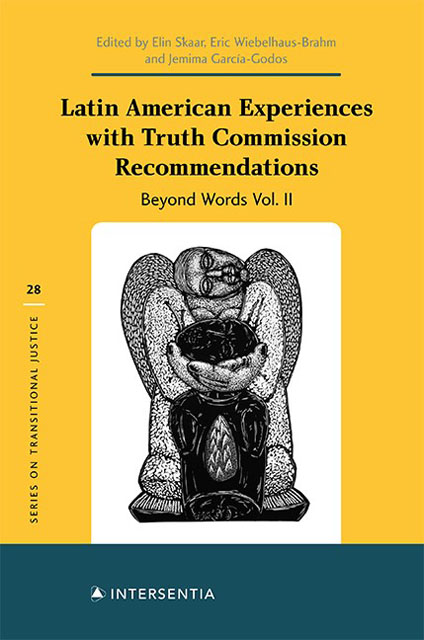El Salvador’s Truth Commission: Recommending Peace in Exchange for Justice
Published online by Cambridge University Press: 19 November 2022
Summary
INTRODUCTION
The transition to democracy in El Salvador after 12 years of internal armed conflict (1980 – 92) between the State and the left-wing Frente Farabundo Martípara la Liberación Nacional (Farabundo MartíFront for National Liberation – FMLN) was based on a peace agreement negotiated by the United Nations and signed in1992 in Chapultepec, Mexico. The peace agreement set the premises for the institutional reforms required in the country's transition from internal armed conflict to democracy. As in the rest of Latin America, a truth commission was put in place to address past abuses. Neither the peace agreement nor the truth commission discounted the possibility of future prosecutions for atrocities, yet criminal investigation and prosecution were postponed until the country had a more developed justice system able to perform the task (Martínez and Gutiérrez 2016).
El Salvador received the direct support of the United Nations in its process of ending the conflict and establishing the TruTth Commission of El Salvador (Comisión de la Verdad Para El Salvador; the “CVES” or “the Commission”). The CVES's recommendations, which are examined in this chapter, were one of the key points of the Commission's mandate. At the time the CVES delivered its report, the recommendations offered hope for a structural change in the country and its institutions. However, the scant acceptance of the report by the national population, its rejection by the State's official institutions, and the maintenance of political balance required by the distribution of power between the two main political parties who signed the peace agreements, did not only hinder the possibility of making deep structural changes. These power dynamics have also, in fact, distorted the reforms that have been achieved (Guti é rrez 2015).
HISTORICAL BACKGROUND: INFORMATION ON CONTEXT AND TRANSITION
Since its independence from Spain in 1821, El Salvador has been a country where politics, violence and the economy have been combined to guarantee the predominance of a landed economic elite (Dunkerley 1982; Hume 2014). There have been numerous dictatorships in the country's history, with a predominant role of the Armed Forces in politics, acting in favor of the economic elites (Guidos et al. 1980; Stanley 1996).
The personalist dictatorship of General Maximiliano Hernández-Martínez lasted from 1931 until 1944 and set the basis for a political arrangement between the military and the oligarchy to guarantee the institutionalization of military dictatorship thereafter (Artiga 2015, 52).
- Type
- Chapter
- Information
- Latin American Experiences with Truth Commission Recommendations: Beyond Words Vol. II , pp. 317 - 372Publisher: IntersentiaPrint publication year: 2022



